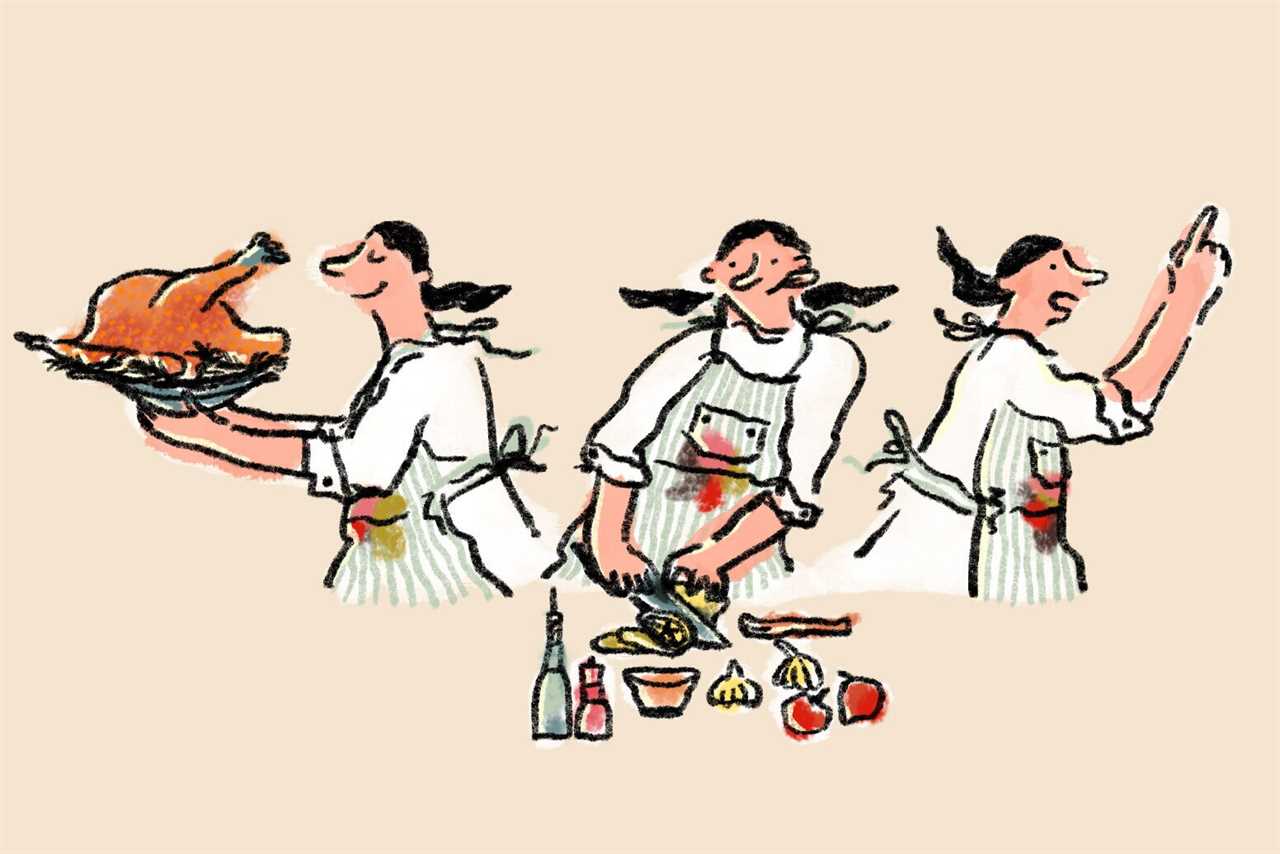This Thanksgiving, sit down. Take my word for it.

Here is a story I consider pivotal to my childhood: I am approximately six and we are visiting my mother’s parents in La Jolla, California, where we do not live. My mother is preparing dinner for a hodgepodge of assembled guests. A distant relative wanders into the kitchen and wonders aloud what she is making. He does not wait for an answer. He opens the pot. Her rice is ruined, or at least, her rice is marginally worse. She will never forget it. I will also never forget it, although I have very little recollection of it happening.
There are moments that shape us. For me, this was one. "Do not open rice pots," is a lesson I learned, in subsequent retellings over the next twenty-something years. Also: get out of other people’s kitchens. This sounds harsh, I know. In sitcoms and commercials, people cook together all the time. Thanksgiving, especially, is a holiday for communal cooking and feasting; togetherness is the whole point!
I want to want the small kitchen in my Brooklyn apartment filled with friends, laughing uproariously, sautéing mushrooms in a cheerful and cooperative manner, rosy-cheeked, unbothered by the fact that there is one cutting board and the potatoes might be burning. I do not.
There is an idea that, when you’re invited to someone’s home for dinner, the more you are involved, the better. "Can I help?" you are supposed to ask your host. Or: "Is there anything I can do to help?" One recent, much lambasted Wirecutter article, in fact, suggests you go a step further, arriving at the designated hour already wearing your own apron, and declaring "I’m here to help."
This is nice. This is kind. People want to help. They like tasks! I understand the impulse. An elaborate dinner is so much work, of course, we all know that. Who could possibly object to the offer of free and friendly help?
Me. I do.
I love cooking for other people. "Come over for dinner!" I tell friends, and friends of friends, and mean it. Sometimes they even do! For years, a big group of us would rent a house in the middle of nowhere for New Year’s Eve, and then I would spend several weeks obsessing about what to make, lugging my preferred brand of tortillas across state lines, Amtraking with bricks of local tofu. I am hospitable, I think!
And yet for me, cooking, especially festive cooking, is a time to be alone. I have planned the meal, prepped the meal, timed the meal, and by the time the guests arrive, the meal is going off the rails. This is part of the process. The last steps—the ones that cannot be done in advance—are the stressful ones.
Picture it: It is Thanksgiving. You are trying to reheat (but not burn) at least five different dishes, which is complicated, because you only have four burners and three pots. The gravy is bubbling and the potatoes are still cold and the Brussels sprouts were supposed to be done 20 minutes ago but are still mysteriously raw. The oven is beeping. Your timer is beeping. Your phone is beeping. The doorbell is beeping. Can I help?
If someone asks to help, you have to say yes, of course, how kind—because it is kind—and then come up with finite but rewarding tasks for them that require no particular skill or knowledge of your kitchen. "You can…peel these carrots?" you suggest. "Want to…dice this shallot?" Then, in my experience, other guests feel guilty for not asking to help, and so half-heartedly also ask what they can do, and suddenly you are counselor at Thanksgiving Cooking Camp, and it’s your job to rustle up a mountain of tiny tasks that will not be completed to your irrationally rigid standards, but what are you going to do, complain about it? Everyone is helping!
Obviously you are grateful, of course, to have friends or family—grateful they want to help, grateful for this quality time teaching a college friend of your husband’s how to strip the leaves off stems of cilantro. It’s just that you will be even more grateful when they get out of your very tiny, very sweltering kitchen.
I worried it was just me (and my mother); that people outside of our immediate family might appreciate assistance. Probably some do! I admire them. A few years ago, though, I was interviewing the legendary chef Jeremiah Tower—he’d just been the subject of a documentary, and we were talking about hot tips for Thanksgiving—and he informed me (unprompted) that he doesn’t want casual offers of kitchen help, either. "I tell them to get the hell out!" he told me, before suggesting that one genuinely helpful thing a guest can do is top off his champagne. I cannot speak for everybody, but Jeremiah Tower thinks I’m right.
It isn’t that I don’t want guests to contribute. I am, in fact, desperate for their participation in the evening. It isn’t that a guest doesn’t have a job. They do. It is: Be delightful. Be entertaining. Make sparkling conversation. Take seconds of anything worth eating. Guests are what make dinner parties fun. An appropriately convoluted story about your subway ride, your boss, your mother, your landlord: that is helping. Allow me to obsess alone over the seasoning of the mashed potatoes; the guest’s task in conviviality. And there is, like Jeremiah Tower says, no harm in topping off my wine.
Top illustration by Giada Maestra.
Related Reading:
Six American Designers Share Their Inspiring New Takes on a Dream Dinner Party
How to Throw a Great Dinner Party, According to Ghia’s Mélanie Masarin
Hosting Thanksgiving This Year? Make Sure It Goes Off Without a Hitch With These Accessories
Read More
By: Rachel Sugar
Title: Actually, You Shouldn’t Offer Help In Someone Else’s Kitchen
Sourced From: www.dwell.com/article/actually-you-shouldnt-offer-help-in-someone-elses-kitchen-0b570f50
Published Date: Wed, 23 Nov 2022 17:37:20 GMT
.png)





